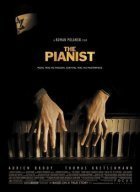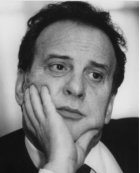
The Pianist Page #13
The sounds of trains not far off.
They carry the stuff into the warehouse.
INT. WAREHOUSE - DAY
Szpilman and the others bring their piles of things into
the warehouse, which is crammed with similar objects, an
Aladdin's cave.
The activity continuous.
INT. SLEEPING QUARTERS, ABOVE WAREHOUSE - NIGHT
semi-darkness. A large room with an improvised partition
of blankets to separate the men from the women. Three-tiered
bunks.
On the men's side, Father is on the upper bunk, Henryk on
the lower. Szpilman, stripping down to his underwear, is
preparing to climb into the middle bunk.
FATHER:
At least we've got work in the
ghetto. At least we're still
together.
Szpilman nods, climbs into his bunk, settles down. Somewhere
near, the sound of a train.
Then a volley of shots, German voices shouting.
Szpilman slips off his bunk, hurries to the door, opens it
and comes face to face with a German NCO and soldiers.
NCO:
Out! Assemble in the yard!
SZPILMAN:
We're employed here, we've got
certificates -
The NCO cracks Szpilman across the face, turns and goes.
Szpilman retreats into the room, his nose bleeding. The
women are watching from behind the blankets, but Mother
hurries towards Szpilman. She wipes his nose.
Shots, shouts, a scream.
Still quite dark. The Szpilmans and about twenty others
lined up under lights shining on them from a couple of
German vehicles.
The NCO goes along the line, making a selection, using his
pistol to prod people into moving. When he gets to the
Szpilmans he selects Henryk and Halina. Then, he turns to
those who are left:
NCO:
The rest of you get dressed then
report back here. Bring your
belongings. Fifteen kilos only.
A YOUNG WOMAN:
Where are you taking us?
The NCO turns his pistol on the young woman and shoots her
through the head. He marches off while she lies on the
ground with blood spurting out of her.
INT. SZPILMAN ROOMS, WAREHOUSE - DAWN
The partition has been pulled aside. People, including the
Szpilmans, are dressing or dressed, packing up their
belongings.
SZPILMAN:
I'm sorry, I did my best, I thought
the certificates would save us
all.
MOTHER:
Stop it, Wladek.
REGINA:
Let's just hope that Henryk and
Halina will be better off -
Sounds of shots, screams, shouts, a piercing whistle.
EXT. STREET LEADING TO UMSCHLAGPLATZ - MORNING
Hot, fine summer's day. Jews, among them Szpilman, Mother,
Regina and father, clutching their meagre belongings, walk
towards wooden gates and come to a halt. Jewish policemen
approach and order the people about, pushing and shoving
them into line.
REGINA:
(to a Jewish
policeman)
Where will we be going?
JEWISH POLICEMAN #1
You're going to work. You'll be
much better off than in this
stinking ghetto. The gates are
The gates are opened.
JEWISH POLICEMAN #2
Move!
They shuffle forward.
EXT. UMSCHLAGPLATZ - DAY
Szpilman, Mother, Regina and Father, with others, enter
through one of the gates, which closes on them. They pause
for a moment to take in their new surroundings.
Their first sight of the large rectangle, walled on two
sides and overlooked by buildings. Several hundred people.
People walk up and down.
SZPILMAN:
Let's sit over there.
But he stops again, and so do the others. Something they
see causes them to stand stock still, expressionless.
THE SZPILMANS' POV:
An unoccupied space at the edge of the compound where
bloated, decaying bodies lie near to a wall. The wall itself
is spattered with blood. Large flies walk over the dead.
Nobody goes near.
THE SZPILMANS:
Szpilman turns away and leads the others to another space.
Later:
Glaring sun. The Szpilmans have settled down on the kerb
of a pavement and are waiting. Szpilman stands, observing
the scene.
Mother sits on a bundle of things, staring vacantly, her
hair hanging down in strands. Regina, beside her, has her
hands over her face and is weeping, the tears running
through her fingers.
Father walks nervously up and down, hands behind his back,
four steps one way, four steps back. Near them, a YOUNG
WOMAN begins to wail.
THE YOUNG WOMAN:
Why did I do it? Why did I do it?
A young man, beside her, whispers to her, but she does not
seem to take in what he's saying. Her cries continue at
intervals.
THE YOUNG WOMAN:
Why did I do it? Why did I do it?
The sound of trucks. Everyone looks towards the gates.
More Jews are being unloaded from trucks and are marched
through the gates. Mothers, children, old people, begging,
most of them holding papers. Pandemonium.
Translation
Translate and read this script in other languages:
Select another language:
- - Select -
- 简体中文 (Chinese - Simplified)
- 繁體中文 (Chinese - Traditional)
- Español (Spanish)
- Esperanto (Esperanto)
- 日本語 (Japanese)
- Português (Portuguese)
- Deutsch (German)
- العربية (Arabic)
- Français (French)
- Русский (Russian)
- ಕನ್ನಡ (Kannada)
- 한국어 (Korean)
- עברית (Hebrew)
- Gaeilge (Irish)
- Українська (Ukrainian)
- اردو (Urdu)
- Magyar (Hungarian)
- मानक हिन्दी (Hindi)
- Indonesia (Indonesian)
- Italiano (Italian)
- தமிழ் (Tamil)
- Türkçe (Turkish)
- తెలుగు (Telugu)
- ภาษาไทย (Thai)
- Tiếng Việt (Vietnamese)
- Čeština (Czech)
- Polski (Polish)
- Bahasa Indonesia (Indonesian)
- Românește (Romanian)
- Nederlands (Dutch)
- Ελληνικά (Greek)
- Latinum (Latin)
- Svenska (Swedish)
- Dansk (Danish)
- Suomi (Finnish)
- فارسی (Persian)
- ייִדיש (Yiddish)
- հայերեն (Armenian)
- Norsk (Norwegian)
- English (English)
Citation
Use the citation below to add this screenplay to your bibliography:
Style:MLAChicagoAPA
"The Pianist" Scripts.com. STANDS4 LLC, 2024. Web. 26 Dec. 2024. <https://www.scripts.com/script/the_pianist_72>.



Discuss this script with the community:
Report Comment
We're doing our best to make sure our content is useful, accurate and safe.
If by any chance you spot an inappropriate comment while navigating through our website please use this form to let us know, and we'll take care of it shortly.
Attachment
You need to be logged in to favorite.
Log In